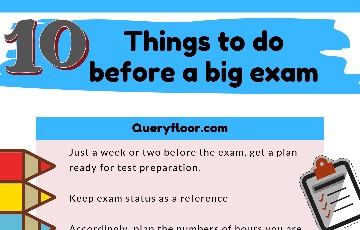
You are fully prepared for your exam if you – take notes – followed up with study at home – revise – practiced the previous year's papers and now you are confident about taking the exam. But there are a few things you should do on the D-day of the exam to achieve the best possible exam results.
1) Turn up early for the exam.
2) Relax
3) Read all the instructions again even if you know most of them – there could be new instructions that you may not be aware of
4) Plan which ones you are going to attempt first
5) Start writing surely and with confidence
6) Answer as many questions as you can
7) Manage time effectively while attempting questions
8) Allot time for checking the paper again and again
9) In case you have more time after checking the paper you can attempt more questions that you are sure of the answer to.
10) Finally, analyze your performance.

There are 10 things to do before a big exam or when you receive your exam timetable.
1) Just a week or two before the exam, get a plan ready for test preparation.
2) Keep exam status as a reference
3) Accordingly, plan the numbers of hours you are allotting for studies.
4) For practical subjects like Math and Science give equal importance to both theories and practice time sessions
5) Next plan how you are going to utilize it to cover all the subjects for the exams.
6) Practice more past papers to get the hang of the exams
7) Eat good food
8) Do not ignore your night’s sleep or else you will be groggy
9) Instead of sitting at your study desk at all hours, take out some time for exercise, at least try walking
10) Most importantly do not panic. Just be a cool and complete revision
Here are some tips to follow if you are underperforming your aptitude:
1) Accept the fact and denying only delays time
2) Adopt a positive attitude now to stay on course
3) Check the areas you are underperforming
4) Analyze your weak areas and allot more time to them
5) Talk to teachers and seek study tips
6) In class follow what is going on with utmost concentration
7) Take notes writing to the next level – write crisp notes, compare with friends, and review once the chapter is done
8) Ask if you need any clarifications
9) Allocate more time to studies – avoid other activities which consume your time
10) Improve your language skills to communicate in your answers better
11) Try memory improving techniques
12) Tomorrow never comes! Do not postpone!
13) Take the help of friends or a study group
14) Take tests regularly
15) Revise for longer even before you get your exam timetable
16) Take care of your health; sometimes health issues could reduce your grades
17) Refer to other sources for studying
18) Self-tests also help
19) Be cool on the day of the exam and do your best
FlashcardExchange - is a tool to create flashcards, saving you a lot of time.
Time edition – helps you track how much time you spend learning.
PocketMod – can help compress your study material into small blocks – for example, you can store all your math formula details together on one page. Whip it out when you want to learn them by heart.
Web Seavus Dropmind and MindMeister are two online packages that can help you create Mindmaps.
Some best content resources for subjects, especially Math and Science online, are Khan Academy, Brilliant, Virtual Nerd, STEM, Desmos, GeoGebra, CanFigureIt Geometry, and PhET Interactive Simulations, and CueThink.
"The road to success and the road to failure are almost exactly the same." -- Colin R. Davis

● Pay attention to the class and then start taking notes.
● Refer to your previous lecture notes before being ready for the next class.
● Write legible notes.
● Keeping your notes organized in binders is a good idea as you can add extra papers in between when necessary.
● Use highlighters, pencils, and pens to highlight headings and subheadings.
● Start a new page for a new lecture.
● Leave space for comments or extra notes.
● Write fast but cover everything.
● Choose a note-taking method that you are comfortable with.
● Seek clarifications if required.
● If something is illogical, clarify and complete writing then and there.
● Compare notes with your friends if the need be.




